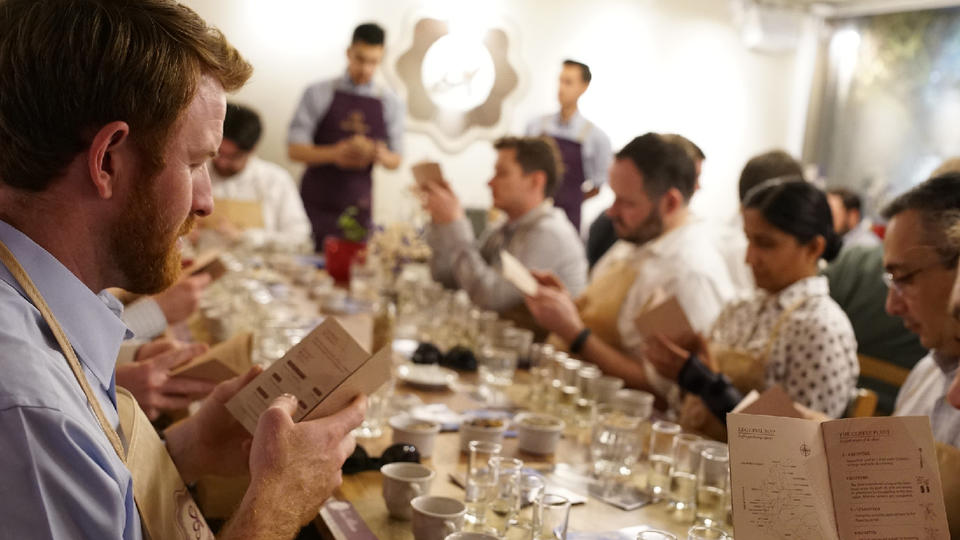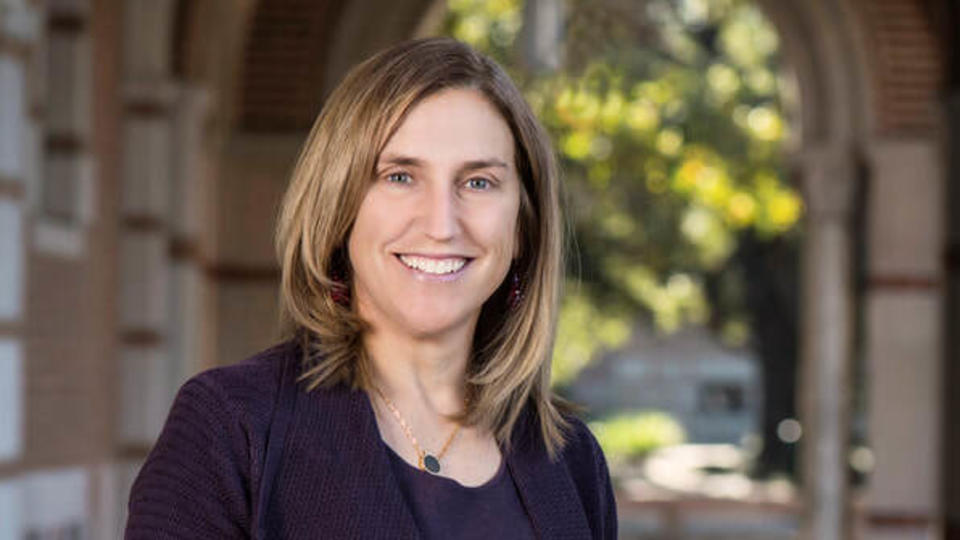Starting Up

Twenty years after the first Rice Business Plan Competition, Houston’s entrepreneurial ecosystem is booming (and Zooming).
MBA students from all over the world donned Zoom-appropriate business attire this summer to deliver their business pitches virtually for the first time ever in the history of the Rice Business Plan Competition.
The competition, the world’s richest and largest graduate-level student startup competition, turned 20 this year during extraordinary times. Postponed from April because of the coronavirus pandemic, the competition went online in June, when up-and-coming entrepreneurs vied in virtual rooms for coveted prize money to invest in their growing businesses, taking home over $1.3 million in investment, cash and in-kind prizes.
Over the last 20 years, startups that competed in the RBPC have raised more than $2.3 billion in funding, including several in Houston. The competition’s platinum anniversary is a reminder that Rice Business has played a critical role in the development of Houston’s startup culture over the past two decades. Another reminder came when Rice’s graduate entrepreneurship program was rated No. 1 in the U.S. by the Princeton Review this year.
“Rice has been ahead of the curve,” says Harvin Moore, the head of Houston Exponential, a nonprofit that helps accelerate the growth of Houston’s technology innovation ecosystem. “We’re really seeing a blossoming of startups now.”
Building a Foundation
Years before the rest of the world began to recognize Houston as an important innovation hub, especially in medicine and energy, Rice dedicated vast resources to building an ecosystem for nurturing startups and their founders, Moore says.
In fact, Rice Business was one of the first graduate programs to offer entrepreneurial studies as a curriculum. Founded in 1978 under the direction of the late economist Edward E. Williams, and expanded with the help of entrepreneurship professor Al Napier, by 2009 the Rice Business entrepreneurship program was ranked No. 5 in the U.S. by the Princeton Review.
Rice’s OwlSpark Accelerator, founded in 2012, and the Liu Idea Lab for Innovation and Entrepreneurship (Lilie), created three years after that, have added even more support for Houston-based entrepreneurs.
For Rice students, the Lilie Lab is a one-stop shop for entrepreneurship. It develops and runs graduate and undergraduate courses, workshops, lunch and learn sessions, an incubator space and a mentor network. When it launched five years ago, Rice Business offered only a handful of entrepreneurship classes. Now, graduate students can choose from Lilie’s 20-plus experiential entrepreneurship classes, and undergrads from eight. The Lilie team also created the Rice Alumni Entrepreneurs and Innovators Network, which holds events for alums across the country. Through Lilie’s E-labs, future entrepreneurs can launch a venture or work alongside industry professionals to explore venture creation, venture capital, and acquisitions and mergers.
For our alumni, we wanted to create a place where they could go for resources, to mix, and to make valuable connections.
Professor Yael Hochberg, head of the Rice Entrepreneurship Initiative
“If you’re on campus and you ask someone, ‘What is entrepreneurship at Rice?’ they’ll point to Lilie,” says Yael Hochberg, the Ralph S. O’Connor Professor in Entrepreneurship and head of the Rice University Entrepreneurship Initiative. “And for our alumni, we wanted to create a place where they could go for resources, to mix, and to make valuable connections.”
Now, the university is seeing the fruits of its labor — and so is the surrounding community. With only a few dozen startups in 2005, Houston is home to more than 1,000 today. At the same time, startup development organizations have jumped from only a handful seven years ago to more than 32 in 2020.
Venture capital into the city has also ballooned. From 2016 to 2019, the amount of capital invested in Houston startups more than doubled, rising to $599 million from $269 million, according to Pitchbook. In January, Houston saw its first ever unicorn company, or privately held startup with a value of over $1 billion: Fintech company HighRadius. Moore says it’s only a matter of time before the city sees a second unicorn emerge from the Texas Medical Center and its TMCx Accelerator.
Startups in Houston will also benefit from targeted programming and invaluable connections forged at the Ion, the Rice-led collaborative hub for entrepreneurs, incubators, accelerators, corporations and the academic community when it opens on the site of Houston’s former Sears Department Store. The Ion is envisioned as the connective glue that binds the city’s startup community, taking it to a new level.
When it comes to entrepreneurship and innovation, “the future looks really good for Houston,” says Brad Burke, director of the Rice Alliance for Technology and Entrepreneurship (often called just “Rice Alliance”).
It’s a future that might not have been possible without the solid foundation laid by the university. “Rice has really been critical to Houston joining the big leagues,” says Moore.
Planting the Seed
One of Rice’s key efforts to support entrepreneurs has been the Rice Alliance, a collaboration between Rice Business, the School of Engineering and the School of Natural Sciences. The seed that grew into the alliance was planted in the late 1990s, when Steven Currall, then an associate professor of management and psychology at Rice, read in Fortune magazine about how Stanford helped to create Silicon Valley. Currall, who is now the president of the University of South Florida, was inspired to create the Rice Alliance along with colleagues from across Rice, and in the last 20 years, more than 2,500 companies have participated in over 220 Rice Alliance programs, raising more than $8.1 billion in early-stage capital.
“Rice Alliance and its business plan competition bring in hundreds of people from Texas and the region who are not affiliated with the university but really want to be close to our students,” says Rice Business Dean Peter Rodriguez. “Those programs, along with the courses and programs delivered by Lilie Lab and our summer accelerator program, OwlSpark, have been great tools for us to make a big impact on the entrepreneurial ecosystem, even while we’re not a very big school.”
The Rice Business Plan Competition, originally called the Southwest Business Plan Competition, was born in 2001, based on an idea from Houston venture capital investor Dennis Murphree. It was small at first, with only nine teams competing for $10,000. “I said, we need to make this thing bigger,” says Burke, who’s been director of the Rice Alliance since 2001.
As the business plan competition has grown, it has been a catalyst for the formation of several Houston-based angel investor groups, including the GOOSE Society of Texas, founded by Silicon Valley venture capitalist Jack Gill and Compaq co-founder Rod Canion. Now known as GOOSE Capital, it’s given out more than $20 million in awards at the competition.
Led by Rice alum Robert Winter, a dozen judges from the competition also formed the OWL Investment Group, while several women judges started nCourage Entrepreneurs Investment Group. The Artemis Fund, founded by three Houston women, gives an investment prize to a team that includes a woman. Investors’ support has also extended beyond the competition to other Rice and Houston startups.
“RBPC has always been a place to meet and see deals and get funding,” says Andrew Clark, former CEO of The Houston Angel Network and a founder and managing member of the Texas Halo Fund.
Recent data show that 22% of Rice MBA alums have started companies since the school was founded in 1974, and 76% are in business today with revenues over $1.5 billion. 2010 RBPC runner-up Rebellion Photonics, headed up by Allison Sawyer and Robert Kester, went on to raise nearly $20 million in funding. Last year the company had a successful exit when it was acquired by Honeywell.
This year, a Georgia State University team came in first of the 42 competitors: Aurign, which uses blockchain technology to create music publishing contracts in real time. The team took home $375,000, with the potential for more from the angel investors who judged the competition. Other startups placed for creative, potentially life-changing innovations relevant to the COVID-19 pandemic, including remote work solutions and diagnostic tools for chronic and infectious diseases.
The Rice Alliance also shifted its May Energy Tech Venture Day online, with 45 companies pitching to more than 1,400 investors — a larger online audience than they’ve had in person in past years, according to Burke. “There are unforeseen benefits to going virtual,” he says.
Making personal connections in the same room is ideal, he adds, but even after the pandemic subsides, there will still be a place for virtual events. “We’ll probably continue with a hybrid version,” he says.
Supporting Entrepreneurs
When Al Danto, now part of the Lilie Lab team as a lecturer in entrepreneurship, came to study at Rice Business in the 1990s, he remembers just a handful of entrepreneurship classes were available, compared to nearly two dozen today. But even back then, the university’s support for entrepreneurs was significant, thanks to the efforts of Al Napier and Ed Williams.
“Rice was always a place where you could come up with an idea and you had the support and the resources around,” he says. “The Rice Alliance and the business competition formalized that.”
Danto and classmate Heather Kopecky developed a business plan for an international nurse recruiting company during their time at Rice, and with the school’s guidance, obtained funding for their venture from Memorial Hermann and St. Luke’s before graduation. In 2008, they sold their startup to one of the largest international healthcare staffing companies.
A successful entrepreneurial ecosystem, according to Danto, depends on a number of factors: collaboration, technology, support, room to grow, accelerators and incubators, education, capital and talent. “The Rice Alliance was the first formal attempt to pull all of that together,” he says, “and to form a real community. Houston has really adopted a startup mindset and built on that.”
The Next Step
Houston faced a turning point in 2018 when Amazon passed over the city as a potential site for its second headquarters, while Austin and Dallas made the cut.
“It stung,” says Moore. “People started asking what went wrong and what can we do. There were lots of innovative people and companies, but we weren’t creating a lot of startups.” What’s more, little venture capital money was flowing into the city.
It was around that time that city leaders began to formulate a big idea: to create a major entrepreneurship hub in Houston that would unite everyone involved, attract more capital, and catapult the city into the big leagues in the start-up world.
With an eye on Rice-owned land in Midtown, “Rice raised its hand and said, we think we can do that,” says Moore.
For a strong start-up culture, entrepreneurs must meet each other, experiment and fail, and bump into mentors and investors, says Moore. The Ion will make that possible. The 300,000-square foot structure, which is being developed by the Rice Management Company, will support businesses at all stages of the innovation lifecycle and sit at the core of a new 16-acre Innovation District, which will include housing and retail.
“Starting up is messy, and you really need a place to figure it all out,” says Danto. The Ion will do that, complementing other recently opened coworking spaces and entrepreneurship hubs including The Cannon in West Houston and Houston Exponential.
Before the pandemic hit, the Ion was slated to open in January 2021. Now, much of its programming has started up virtually, including career readiness webinars for college students and work with startups in the Ion’s Smart and Resilient Cities Accelerator, a program focused on implementing new civic technologies.
“Houston has had several false starts in supporting an innovation ecosystem,” says Jan Odegard, interim executive director of the Ion. “What’s different now is that we’ve been quite honest about what’s in our DNA, what do we excel in,” which includes innovation in medicine, energy and technology.
Christine Galib, senior director of accelerator programs at the Ion, envisions the center thriving in 2021, with entrepreneurs, academics and investors all colliding. A student might chat up an entrepreneur at the coffee bar, and a professor run a boot camp before guiding students in a prototyping lab. A startup owner could take an XR class down the hall from a robotics lab where a venture capitalist observes the action.
“There’s this pipeline happening in real time,” Galib says.
Burke believes the Ion’s opening will be a defining moment for the city, helping Houston become one of the top three centers of entrepreneurship in the U.S.
Danto agrees, and expects Rice to continue helping drive Houston’s startup culture. “Rice has always been at the epicenter,” he says. “Houston is a vibrant place where people want to be now. We’re going to attract talent here. Houston can really emerge as a leader.”
Deborah Lynn Blumberg is a Houston-based freelance writer specializing in health and wellness and business and finance.
Update: A previous version of this article erroneously stated that the Princeton Review had named Rice the top undergraduate school for entrepreneurship in 2020. Rice’s graduate entrepreneurship program was ranked No. 1; the top undergraduate entrepreneurship program was at the University of Houston.


